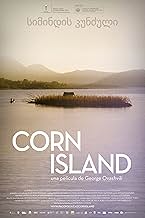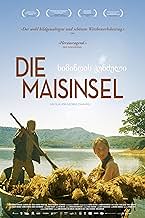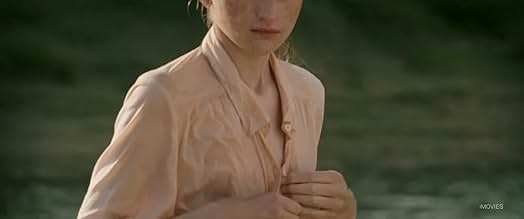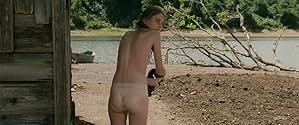Simindis kundzuli
- 2014
- 1h 40min
CALIFICACIÓN DE IMDb
7.4/10
4.8 k
TU CALIFICACIÓN
Agrega una trama en tu idiomaThe river creates and the river destroys in an eternal cycle that even man can't escape.The river creates and the river destroys in an eternal cycle that even man can't escape.The river creates and the river destroys in an eternal cycle that even man can't escape.
- Dirección
- Guionistas
- Elenco
- Premios
- 23 premios ganados y 12 nominaciones en total
- Dirección
- Guionistas
- Todo el elenco y el equipo
- Producción, taquilla y más en IMDbPro
Opiniones destacadas
One of the main goals of art film is to depict life in its most pure, elemental state. Yet few art movies have managed to achieve that goal with as much grace and poetic depth as George Ovashivili's Corn Island. This immaculately composed film takes the viewers on a soul-touching journey into the desolate, breathtakingly beautiful wilderness of a small island in Georgia and perfectly captures the rhythm of nature and the relation between nature and the two main characters whose daily struggles are interweaved into the light, sound and motion of nature around them. Throughout the film, the viewer can't help but feel the life-like, natural quality of every picture and scene. There are no excessive details; everything is distilled into its most natural state. The image of the old man's granddaughter sitting on the boat with a bundle of shining reed under the crisp sunlight is a precise portrait of life itself. In essence, art has blended into life, and life into art. What is more remarkable is that the director has managed to convey this profound state of life without the help of dialogue. Perhaps one could argue that it is precisely the lack of dialogue that has made this film that much more powerful and moving. A scene in the beginning where the old man fondly looks at a little bird pecking at the wood conveys a sense of elegance that no language can easily convey. Even the intermittent gunshots we hear in the background and the discovery of a wounded soldier that temporarily disrupts the tranquility of the island do not lead the film to deviate from its original artistic path. On the contrary, the tension lurking in the background elevates the humanistic aspect of the film to a new height. In the end, every human gesture and activity is dissolved into the larger nature. What we are left with is a film that touches the depth of our soul with such simplicity and gracefulness that very few films can match.
Every year the Enguri River drops to reveal small fertile islands. Because the river marks the natural border that separates Georgia from Abkhazia, these islands are unclaimed territory. Peasants come every year to live on them during the growing season, attempting to harvest enough corn to survive the winter. Two problems face them; the fact that the two nations have been in some form of conflict since the 90's and the rising waters of the Enguri.
Clearly influenced by the likes of Dreyer and Bela Tarr, Director George Ovashvili's slow-burning, minimalist thriller takes place entirely on and around one of these tiny islands. We follow an old man, referred to only as Grandpa, and his grand-daughter as they methodically bring supplies to the island and construct a small shack. They will have to live on this island in order to tend to and protect their little patch of corn.
The film is low on plot and with nearly no dialogue and yet the sweeping cinematography gives the film an epic tone. This island means everything and nothing. The river creates and the river destroys. The island is a microcosm of man against nature, of the political instability of the region and of life itself. The amount Corn Island is able to achieve with so little is commendable.
A grand achievement, Corn Island hints at a bright future for Georgian cinema and puts George Ovashvili on the radar as a director to watch.
Clearly influenced by the likes of Dreyer and Bela Tarr, Director George Ovashvili's slow-burning, minimalist thriller takes place entirely on and around one of these tiny islands. We follow an old man, referred to only as Grandpa, and his grand-daughter as they methodically bring supplies to the island and construct a small shack. They will have to live on this island in order to tend to and protect their little patch of corn.
The film is low on plot and with nearly no dialogue and yet the sweeping cinematography gives the film an epic tone. This island means everything and nothing. The river creates and the river destroys. The island is a microcosm of man against nature, of the political instability of the region and of life itself. The amount Corn Island is able to achieve with so little is commendable.
A grand achievement, Corn Island hints at a bright future for Georgian cinema and puts George Ovashvili on the radar as a director to watch.
George Ovashvili's film was showing on my cable, and I decided to check it out... it's actually a film from a decade ago that made the rounds at every major film festival and ended up with 23 wins and 12 nominations! I must say, it truly deserved every single one of them!
The story, written by Roelof Jan Minneboo, George Ovashvili, and Nugzar Shataidze, transports us to Georgia, where the Inguri River's water level drops annually, revealing islands with fertile river-bottom soil. The locals can temporarily claim these islands for a season to grow crops, so an elderly man in an old wooden boat slowly makes his way to one such island. He measures it, digs the earth, tastes the soil, decides it's suitable, and marks his claim with a piece of cloth on a stick. He leaves and returns repeatedly, bringing supplies, including scrap lumber to build a cabin with a thatched roof, and then planting corn with the help of his teenager granddaughter. Almost no words are spoken, so don't worry if you don't have subtitles (for some reason, I only had German subtitles) - you'll be just fine!
A significant aspect of this film is the profound connection between the man and nature, conveyed through captivating imagery and visuals - a timeless story that seems so primitive... intentionally so, in my opinion.
Another aspect of the film is the island's location: in the middle of the Inguri River, dividing Georgia from Abkhazia. This off-screen conflict brings soldiers from both sides, disturbing the intense bond between nature and the old man and his granddaughter.
The film takes its time with everything, and it follows the nature's pace of the flowing river, growing corn... and it feels great watching things unfolding slowly. Real life feeling! Almost perfect film!
The story, written by Roelof Jan Minneboo, George Ovashvili, and Nugzar Shataidze, transports us to Georgia, where the Inguri River's water level drops annually, revealing islands with fertile river-bottom soil. The locals can temporarily claim these islands for a season to grow crops, so an elderly man in an old wooden boat slowly makes his way to one such island. He measures it, digs the earth, tastes the soil, decides it's suitable, and marks his claim with a piece of cloth on a stick. He leaves and returns repeatedly, bringing supplies, including scrap lumber to build a cabin with a thatched roof, and then planting corn with the help of his teenager granddaughter. Almost no words are spoken, so don't worry if you don't have subtitles (for some reason, I only had German subtitles) - you'll be just fine!
A significant aspect of this film is the profound connection between the man and nature, conveyed through captivating imagery and visuals - a timeless story that seems so primitive... intentionally so, in my opinion.
Another aspect of the film is the island's location: in the middle of the Inguri River, dividing Georgia from Abkhazia. This off-screen conflict brings soldiers from both sides, disturbing the intense bond between nature and the old man and his granddaughter.
The film takes its time with everything, and it follows the nature's pace of the flowing river, growing corn... and it feels great watching things unfolding slowly. Real life feeling! Almost perfect film!
"Corn island" is about islands that run dry in early spring and are swallowed up by the river again during winter. In the meantime it is very fertile land and farmers from the neigbourhood are keen to occupy such an island in order to sow and harvest corn.
From the above description it is clear that "Corn island" is a slow movie about a slow and peaceful live. You can nearly see the corn crow. This slow and peaceful live however is disrupted in multiple ways.
In the first place is the corn island of this movie situated in a disputed territory between two countries. Rival soldiers are regularly passing by the island. The farmer is determined to stay out of this war. Will he succeed? This aspect of the film reminded me of the Dutch novel "The house of refuge" (1952, Willem Frederik Hermans).
A farmers live is always governed by the seasons, but that is especially true if your field is on a temporary island. The second cause of disruption.
Not only the corn is growing, but also the granddaughter of the farmer. This fact does not pass unnoticed by the passing soldiers, forming the third disruptive force. This third aspect of the film is in my opinion the weakest. The coming of age is portrayed using a lot of clichés such as suddenly being tired of your favorite doll or experiencing the first menstrual cycle.
After "In bloom" (2013, Nana Ekvtimishvili) "Corn island" was the second film from Georgia I saw within a year. Remarkable was the large share that the grandparents had in both films in raising their grandchildren. A coincidence?
From the above description it is clear that "Corn island" is a slow movie about a slow and peaceful live. You can nearly see the corn crow. This slow and peaceful live however is disrupted in multiple ways.
In the first place is the corn island of this movie situated in a disputed territory between two countries. Rival soldiers are regularly passing by the island. The farmer is determined to stay out of this war. Will he succeed? This aspect of the film reminded me of the Dutch novel "The house of refuge" (1952, Willem Frederik Hermans).
A farmers live is always governed by the seasons, but that is especially true if your field is on a temporary island. The second cause of disruption.
Not only the corn is growing, but also the granddaughter of the farmer. This fact does not pass unnoticed by the passing soldiers, forming the third disruptive force. This third aspect of the film is in my opinion the weakest. The coming of age is portrayed using a lot of clichés such as suddenly being tired of your favorite doll or experiencing the first menstrual cycle.
After "In bloom" (2013, Nana Ekvtimishvili) "Corn island" was the second film from Georgia I saw within a year. Remarkable was the large share that the grandparents had in both films in raising their grandchildren. A coincidence?
Every spring the Inguri River, which forms the boundary between Georgia and Abkhazia, washes down rocks and soil creating tiny islands. Local peasants leave the riverbanks for the firm, fertile island soil to grow corn through the summer before they are eroded away by winter. Georgia's submission for Best Foreign Language Film Corn Islanddirected by George Ovashvili follows a nondescript ageing farmer and his naive granddaughter as they migrate to an island and cultivate a year's crop. During such time, border patrols from both Georgia and Abkhaz pass by, causing tensions to rise between each other while the protagonists are caught in the middle.
Corn Island provokes an idea most memorable in the finale of Jean Renoir's The Grand Illusion – this illusion being the definitions of land ownership. Through nature's creation of a temporary island and then the Old Man's claim of his own little country, the film poetically points out the irrationality of conflict over differences from being born on different pieces of land. It's thoroughly profound, but one only teased in the otherwise sparse film. Ovashvili's approach is very reminiscent of the work of Ki-duk Kim, especially Spring, Summer, Fall, Winter and Spring, with the tranquil relationship with nature, meditative pace and limited dynamics, but equal in their beauty.
The narrative is procedural, simply watching the characters build a hut, plant the seeds and farm the crop. It's lethargic, but engaging. For the most part, the characters are blank slates, but it's about what they represent. It's all about the elements, and they're always fragile and unbalanced, as the film works on the natural tension of impending and inevitable expiration. Tensions do rise when the soldiers pass by in the boats, and there is character development with the granddaughter, who's in the throes of puberty. As she catches their eye and they to her, her internal conflict about her desires for outsiders illustrates the fateful and fatal sparks between nations.
The film's elegance is owed to the precise and impressive aesthetics. Veteran Hungarian cinematographer Elemer Ragalyi's serene gliding photography captures the world on a grand but desolate scale. In essence, the film is a soundscape, with no dialogue and hardly any score until near the end. The sharp sound work creates a palpable atmosphere like last year's All is Lost. The film does suffer in its rare moments of dialogue as Ovashvili is more confident in the naturalistic poetry of man against man and man against nature but those scenes don't drag the film down. Corn Island is a slow-burning but well-executed thought- provoking film that's worth watching, especially for fans of art cinema on the lookout for fresh faces.
8/10
Read more @ The Awards Circuit (http://www.awardscircuit.com/)
Corn Island provokes an idea most memorable in the finale of Jean Renoir's The Grand Illusion – this illusion being the definitions of land ownership. Through nature's creation of a temporary island and then the Old Man's claim of his own little country, the film poetically points out the irrationality of conflict over differences from being born on different pieces of land. It's thoroughly profound, but one only teased in the otherwise sparse film. Ovashvili's approach is very reminiscent of the work of Ki-duk Kim, especially Spring, Summer, Fall, Winter and Spring, with the tranquil relationship with nature, meditative pace and limited dynamics, but equal in their beauty.
The narrative is procedural, simply watching the characters build a hut, plant the seeds and farm the crop. It's lethargic, but engaging. For the most part, the characters are blank slates, but it's about what they represent. It's all about the elements, and they're always fragile and unbalanced, as the film works on the natural tension of impending and inevitable expiration. Tensions do rise when the soldiers pass by in the boats, and there is character development with the granddaughter, who's in the throes of puberty. As she catches their eye and they to her, her internal conflict about her desires for outsiders illustrates the fateful and fatal sparks between nations.
The film's elegance is owed to the precise and impressive aesthetics. Veteran Hungarian cinematographer Elemer Ragalyi's serene gliding photography captures the world on a grand but desolate scale. In essence, the film is a soundscape, with no dialogue and hardly any score until near the end. The sharp sound work creates a palpable atmosphere like last year's All is Lost. The film does suffer in its rare moments of dialogue as Ovashvili is more confident in the naturalistic poetry of man against man and man against nature but those scenes don't drag the film down. Corn Island is a slow-burning but well-executed thought- provoking film that's worth watching, especially for fans of art cinema on the lookout for fresh faces.
8/10
Read more @ The Awards Circuit (http://www.awardscircuit.com/)
¿Sabías que…?
- TriviaIn order to find the location for this movie, the filmmakers had been looking for a real island for two years. Eventually, they realised it would be too complicated and too dangerous to film on such a place. Instead, they built the island on an artificial lake, where they could control the water level to some extent, director George Ovashvili revealed in an interview.
- ConexionesReferenced in CT na MFF Karlovy Vary 2017: Generální reditel Petr Dvorák (2017)
Selecciones populares
Inicia sesión para calificar y agrega a la lista de videos para obtener recomendaciones personalizadas
- How long is Corn Island?Con tecnología de Alexa
Detalles
- Fecha de lanzamiento
- Países de origen
- Sitio oficial
- Idiomas
- También se conoce como
- Corn Island
- Locaciones de filmación
- Productoras
- Ver más créditos de la compañía en IMDbPro
Taquilla
- Presupuesto
- EUR 1,500,000 (estimado)
- Total a nivel mundial
- USD 37,445
Contribuir a esta página
Sugiere una edición o agrega el contenido que falta

Principales brechas de datos
By what name was Simindis kundzuli (2014) officially released in Canada in English?
Responda





















